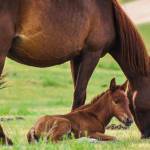Vitamin E and Coenzyme Q10: Antioxidants in Assisted Equine Reproduction

Targeted nutritional supplementation can improve mare and stallion fertility. Nutritionists and veterinarians often recommend antioxidants, including vitamin E and coenzyme Q10, for breeding animals.
Assisted reproductive technologies such as embryo transfer, in vitro fertilization, and intracytoplasmic sperm injection must take place in a laboratory environment that best mimics the natural one. Because of the artificial environment, removing cellular breakdown products that can be toxic to cells can be challenging. Harmful reactive oxygen species (ROS) are produced during cellular metabolism in these artificial systems.
“ROS are negatively charged, highly reactive, and unpredictable molecules that damage cell membranes, genetic material, and proteins by forming other free radicals by peroxidation. Antioxidants act by neutralizing or counteracting the harmful effects of ROS,” explained Kathleen Crandell, Ph.D., a nutritionist for Kentucky Equine Research.
Some ROS are necessary for normal reproductive functions. They play a role in capacitation, for instance, which enables sperm to fertilize an egg, and they also facilitate sperm-egg fusion.
When ROS production outpaces antioxidant defenses, vitality and motility of sperm decreases. ROS also break down the natural antioxidant mechanisms of egg and sperm cells, creating an environment that is unable to support normal reproductive physiologic processes.
Antioxidants such as vitamins E and C can squelch excessive free radicals, thereby supporting normal reproductive function. These antioxidants can be added to the semen extenders and cell culture media in the laboratory and, importantly, they can be added to the diets of mares and stallions.
“Assisted reproductive technologies play an invaluable role in the equine industry. They allow the mingling of genetic material from coveted mares and stallions without the expense and inconvenience of transporting the animals,” said Crandell.
The technologies also protect mares from post-breeding infections, inflammation, and trauma. Subfertile or aged mares may also have improved breeding success, which prolongs their time in the breeding herd as a contributor of valued genetics.
According to Crandell, using a highly bioavailable form of vitamin E, like Nano-E, a natural-source nanodispersed supplement from Kentucky Equine Research, will be more effective than other formulations when used in assisted reproductive technologies. Nano-E targets ROS that affect the viability of the delicate sperm, eggs, and embryos.
“Research has further shown that using vitamin E with coenzyme Q10 effectively maintains membrane integrity and functionality of the sperm. During the cooling processes of equine semen, these antioxidants are influential in increasing sperm motility and reducing lipid peroxidation. Kentucky Equine Research offers Nano-Q10, a nanodispersed form of coenzyme Q10 with improved absorption over other forms of the antioxidant,” Crandell said.
*Ciani, F., L. Maruccio, N. Cocchia, D. d’Angelo, D. Carotenuto, L. Avallone, A.A. Namagerdi, and S. Tafuri. 2012. Antioxidants in assisted reproductive technologies: An overview on dog, cat, and horse. Journal of Advanced Veterinary Animal Research 8(1):173-184.








